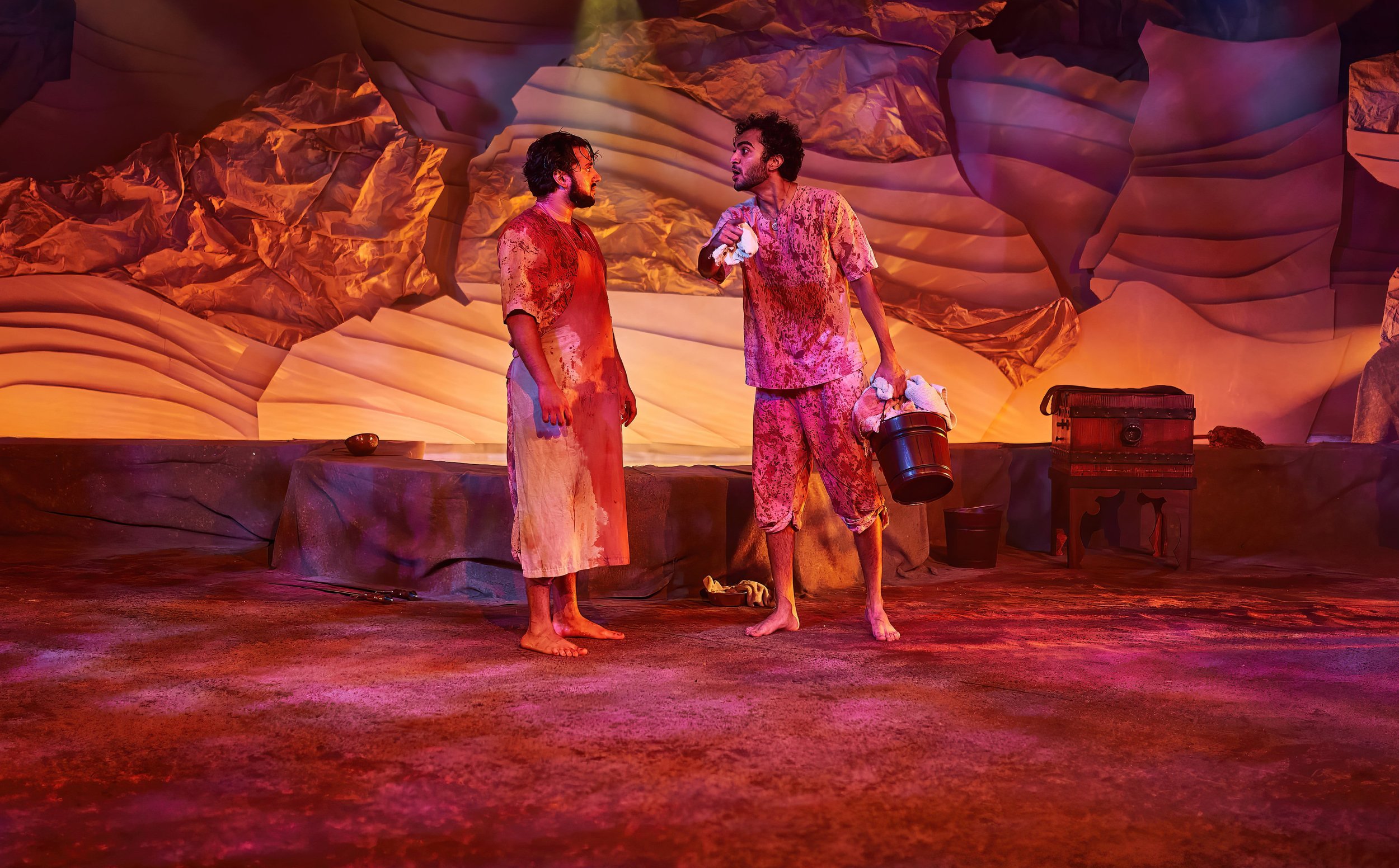Guards at the Taj @ Stage West Theatre
Photos by Evan Michael Woods
—Review by Jan Farrington
They call one another “bhai,” the Hindu word for brother. They’re low-level Imperial Guards in 17th-century Hindustan/India—buddies since early days in the army who’ve never yet found a foothold on the ladder to success. They agree: “We get the jobs nobody else wants.” And though one’s father is a higher-up in the service, his son says flatly, sadly, that he “longs for my defeat.”
In Stage West’s production of Rajiv Joseph’s award-winning Guards at the Taj, life is going nowhere. Why should we watch?
For one thing, the compelling actors—two faces new to Stage West I’d very much like to see again. Rahul Joshi plays guard Humayun—well-connected, cautious, a rule-follower under his father’s heavy thumb. And Dhruv Ravi is Babur—chatty, dreamier, more imaginative and impulsive by nature. There is a feel of Rosencrantz and Guildenstern about them—minions with a ping-pong banter that’s fun to hear.
And for another “why” there’s the puzzle of the play itself, which so clearly wants us to think important thoughts about art & beauty, & imagination, and what it adds to our shared human existence. But early on, Guards veers into a story that seems more about blind obedience to power—and about the many ways our dreams, our excitement about the richness of life, fall victim to expediency and ambition. We can still hear, see, feel the beautiful…but we know we’ve devalued it, and ourselves.
Where does Beauty come into the story? It’s 1648, and Humayun and Babur are guarding the almost-finished Taj Mahal. Don’t get excited. Their job (another rotten posting) is to stand outside the wall that protects the building site—and never, not once, turn around to take a look at this singular object of beauty.
We don’t get a look either, but there’s beauty enough in the intricate pierced-wood panels that frame the stage in Brian Clinnin’s set design, and in the curving white stones—Taj Mahal stones—of a cavern (or quarry?) where things happen. There’s beauty in costume designer Amy Poe’s swirling uniforms, in Bryan Stevenson’s chameleon lighting, and in Ryan Simón’s quietly insistent music choices.
Some 20,000 skilled workmen—and one very happy architect—have worked on this tribute from a Shah to his beautiful dead wife. The Shah is all-powerful and obsessed with Taj Mahal. To what lengths will he go to preserve its unique perfection?
To stave off boredom, Babur imagines his dream posting, “harem duty.” He invents Jules Verne-ish machines, recalls their past adventures, gossips about the Shah. Humayun warns Babur his tongue will get him in trouble: there are so many precise levels of sedition, treason, and blasphemy to bring them down. Still, Humayun is listening to Babur’s chatter: his brief, flashing smile tells us he’s more than a wooden soldier.
But their quiet posting is about to blow up in their faces. What happens is the stuff of legend (and perhaps historical fact), as our two minions become the avatars of all those who are “just following orders.” There is the bloody aftermath of carnage—not horror-film level, but sobering—and conflict between our two characters. Director Shyama Nithiananda keeps a steady hand on the story, focusing on the ordinary humanity of the extraordinary events. She and the actors find both dry sadness and humor in a “clean up” scene that leaves us feeling raw and anxious. Suddenly, a last order is carried out, and the play leaves us in a dreaming moment, but not one of hope.
If that’s confusing, ultimately so is the play. Joseph’s characters are engaging and memorable, and the dialogue at times wonderfully unexpected and funny. But is there a concentrated “point” here about human life and striving, or many scattered ones? Guards is about tyranny and the long (and ongoing) suppression of freedom. About clashing human desires: for the safe, comfortable life that comes of “playing along”—or a life built of your own free will and dreams. About how (or if) our view of artists and artistry should change if we find that the process of creation is cruel, abusive, ugly. It’s all in there, in Guards at the Taj, but Rajiv Joseph doesn’t—or won’t—tie it in a bow for us. And perhaps that’s fine. Think, people, think.
WHEN: Through November 20
WHERE: Stage West Theatre (821 W. Vickery, Fort Worth)
WEB: stagewest.org


